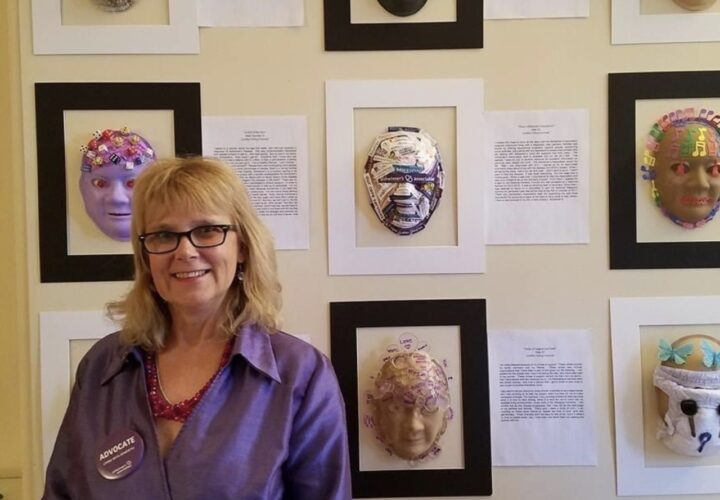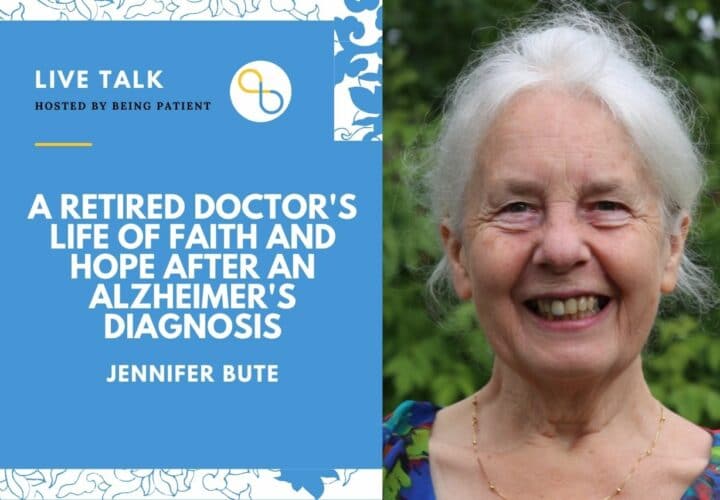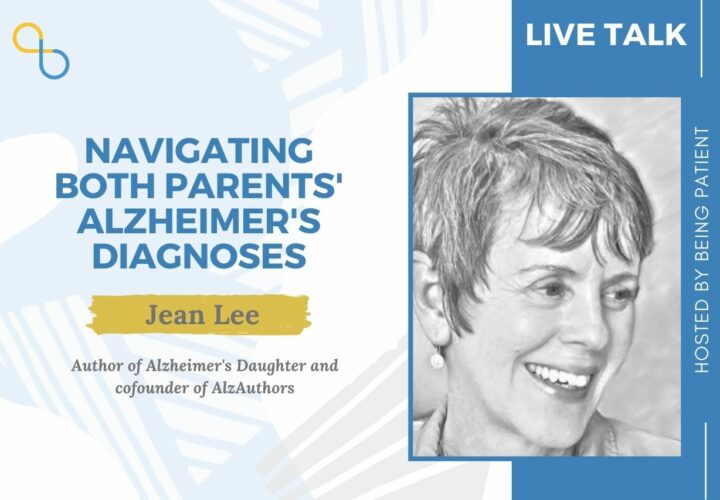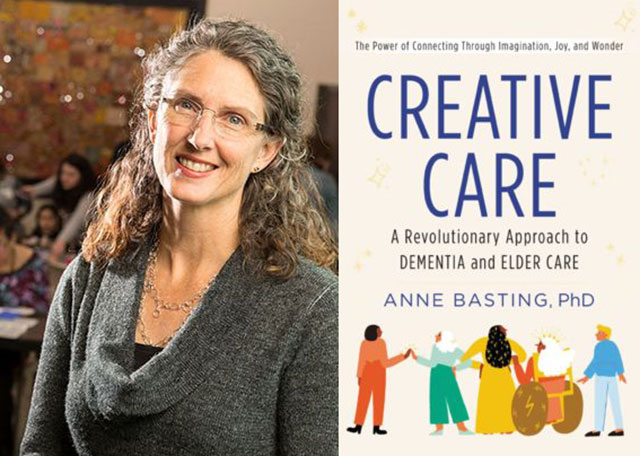After her Alzheimer’s diagnosis, participating in research led former pastor Rev. Dr. Cynthia Huling Hummel to become an author and advocate. Here’s how she went from “Why me?” to “What’s next?” — and how she is pushing for change in clinical trials.
When Rev. Dr. Cynthia Huling Hummel was first diagnosed with amnestic cognitive impairment (aMCI) and had to leave her role as a pastor in upstate New York, she found it difficult to accept, but as she learned more about Alzheimer’s disease and got more into advocacy, she was able to better focus on her future.
“I never expected in my entire life that I would be so involved in Alzheimer’s and Alzheimer’s research,” Huling Hummel said, “but it’s really a blessing.”
Now an author, artist, and Alzheimer’s advocate, she participates in research and advocates for people living with dementia. She also serves on various dementia-related advocacy bodies, collaborated on the proposed study participant’s bill of rights, and wrote a book about her experience with Alzheimer’s.
Huling Hummel joined Being Patient’s Live Talks to discuss her experience with diagnosis, research, advocacy, and living well with Alzheimer’s.
Read or watch the full live talk below.
Being Patient: What were some of the early signs of Alzheimer’s disease for you?
Cynthia Huling Hummel: Each of us is different, but some of the early signs for me were forgetting people’s names and faces. As a pastor, that was really problematic. People come to you often with problems and situations. I often didn’t remember what people had said to me— that was one of them. I was getting lost on the road.
This was, of course, before we had those devices [like GPS and smart phones] that helped us get to places. I had trouble keeping track of time. I would be late for meetings or forget meetings. I had trouble reading, I couldn’t remember what I’d read and actually couldn’t remember what I preached on just a few days prior to that.
I got very frustrated in noisy environments. [I’d] have kind of a panic attack when I was in a very noisy place. Those are some of the things that really got me wondering what was going on with my brain.
Being Patient: What was the diagnosis process like, and what were you diagnosed with?
Huling Hummel: It took me eight years before I got a definitive diagnosis. I went from doctor to doctor, specialist to specialist, and the doctors were very kind. They were trying to be helpful. Because of my age, many thought it was due to menopause, or the fact that I’d had thyroid issues, or that I’d had a head injury, that I wasn’t sleeping well, that I was under a lot of stress, that I was working on my doctorate.
Then I moved to a new church, and I had to start the whole process over. It was a different part of the state. It was a long haul before I was diagnosed with amnestic mild cognitive impairment due to Alzheimer’s disease.
“It wasn’t a surprise, it
was a sadness. But it
was something that
was in our family.”
Now, my mother had Alzheimer’s disease, and her only brother had Alzheimer’s disease. They were farther along in their journey. Their mother — my grandmother — had some sort of dementia [so]it wasn’t a surprise, it was a sadness. But it was something that was in our family.
Being Patient: How many years has it been since you’ve been diagnosed?
Huling Hummel: I’m not good at math, but I left full-time ministry in 2011 because it was interfering with my ability to be an effective pastor. It was in 2011 that I moved from the church where I was, and kind of back into the community. That was really hard.
It’s really hard to make friends and go to new places when you don’t remember who you’ve met [and] don’t remember names. It’s challenging, and my identity was caught up in my profession. I’m a pastor and that was just heart wrenching to me. I’d read [in] the newspaper that there was a class that was starting up for people with Alzheimer’s or dementia at the local community center, and so I signed up for it — eight weeks. That was really helpful in helping me understand what was ahead. That was through the Alzheimer’s Association.
Being Patient: Tell me your thoughts on living well with dementia in the years since diagnosis.
Huling Hummel: I had to get to the point of acceptance, and I think that’s true of most people who face a dementia diagnosis. For many people, they’re just grief stricken, and that’s a normal reaction. For different people, it takes a different amount of time to process.
I think the question for most of us is: how fast will this progress? How long will I be able to do the things that I’d love to do? How do I prepare my children [and] my family for what’s ahead? It took a while for me to move from “Why me?” to “What’s next?” because I had to grieve my old life.
Once I got connected with the Alzheimer’s Association, I served on the local advisory board, and they nominated me for the national board. That just kind of opened a whole new chapter in my life, suddenly telling my story and being able to talk about living well with dementia. My new role, then, was to be an advocate and an ambassador. I got involved in the ADNI study, the Alzheimer’s Disease Neuroimaging Initiative. Being involved in research, oh my goodness, that just opened up a whole bunch of new possibilities.
“I want others to realize there’s hope —
that you can live a wonderful life
in spite of a dementia diagnosis.”
I never expected in my entire life that I would be so involved in Alzheimer’s and Alzheimer’s research, but it’s really a blessing. I’ve met so many wonderful people. I’ve worked with wonderful people on projects. … I want others to realize there’s hope — that you can live a wonderful life in spite of a dementia diagnosis.
Being Patient: You wrote a book called UnMasking Alzheimer’s: The Memories Behind the Masks. Tell us about that project and how it came to be.
Huling Hummel: It’s full of pictures of my masks. I went to an art program at the Community Arts of Elmira, New York. [It] was a specialty program for people living with dementia and care partners, and we’d meet once a month to create a piece of art. One month, we [made] masks.
We were given a blank mask and we could do whatever [we wanted]. And people did different things. [I wanted] to reflect some of the experiences I was having, living with a dementia diagnosis.
This one is called “Forget Me Not”, and it’s just the flowers. Even though I may not remember somebody’s name, my heart will remember the emotion I feel for that person. I remember when my mom got to the point in her journey that she no longer remembered me, but she knew I was somebody that she loved. Each of my masks has a story similar to that.
This one is “Don’t Let the Grass Grow Under Your Feet.” My mom used to say that to us when we were growing up: get busy and volunteer, find something to do, stop feeling sorry for yourself — so I carried that over into my work as an advocate.
[It’s] to help people remember there are still things that we can do to make a difference, to volunteer, whether it’s at your local food pantry at your church or synagogue. Do something to help other people, and you’ll feel better about yourself.
The other one I brought was “Love Remembers.” Even though I may not be able to remember your name, my heart will remember you. So, forget-me-nots, don’t forget me; I’m here — love me, and I love you forever, even though I may not be able to articulate that in the same way that I once did.
I went from making one mask to making 36. I had them all over my dining room table. Some of my masks are dark. There’s one that’s covered with a Depends diaper, because at some point all of us become incontinent. That’s just a reality.
I have one that’s covered with a sponge because my brain feels like [it’s full of holes] — things falling right out of it every day. I have my keys right here. I keep them on a lanyard and they need to be around my neck because I spend time every day looking for things I lose. It’s very frustrating.
“Even though I may not remember
somebody’s name, my heart will
remember the emotion I feel
for that person.”
I used to fake knowing people, though. “How are you, Mark? Good to see you again,” not having a clue. Now I confess to people that I don’t remember how I know them and ask them to tell me a story about us. I’ve heard some amazing stories about things I don’t remember anymore, but I had to be willing to receive help. I was always the helper as [a] pastor visiting people. Now, I’m depending on people to help me, but I had to let go of my pride. That’s a hard thing for many of us.
Being Patient: You’re a collaborator on a Study Participants Bill of Rights, a call to action for leaders of studies on Alzheimer’s disease. Tell us about that.
Huling Hummel: It was published in the Journal of Alzheimer’s Disease and I was part of a team that wrote about a Study Participants Bill of Rights. Many studies don’t have the ability or the desire to return individual results to people.
Like if you go in, there are things that are urgent. If you have an MRI, and they see that you’ve got an aneurysm — that’s urgent and needs to be addressed.
But there are other things that are actionable but not [as] urgent: They might detect you have high blood pressure in the course of a study exam; that’s something that the person should know about so they can speak to their doctor about that situation. There are things that are personally valuable to people: your Alzheimer’s or dementia risk; knowing your APOE4 status.
I have two copies of that gene that puts us at a higher risk, but that helps me to understand as I plan for my future. There are things that we have a desire to know about ourselves, and so it’s our hope through this paper that researchers will think about the person who’s participating in their study, not just as a person who’s coming in to get the study done, but a person with stories, a person with dreams, and we want to know.
Many of us want to know: what did you find in this study? What has changed since the last time we saw you? What has changed in our cognition? What has changed in the scans that you’ve run? What can you tell me that might help me understand my progression? How much time do I have left to be with my kids, my grandkids? That helps us to know.
Having individual results returned to us is something that we have a right to, but you just can’t do it on the fly. It takes a special person to be able to sit down and say, “Mark, let’s go over your results.” This is something that we’ve noticed, and to do that with compassion and training. The funding for that has to be built into the study. As the researchers are thinking about the design of their study and looking for funding, they need to figure [that] into it.
That’s something that I’ve been working on with others to share that with researchers and have them talk about it and move forward. People who are in studies want to know why you learn of a study that’s ending on the news and not hear from your researchers.
First, there are lots of things that need to be considered in research, but we’re your partners. We want to work with you. We want to help find new treatments. We want to get to the point where we can prevent Alzheimer’s, that it becomes a preventable disease or a disease treated like diabetes.
“Many of us want to know: What did
you find in this study? What has changed
since the last time we saw you?
What has changed in our cognition?”
We’re moving closer and closer to that time where it’s such a time of hope. That’s one of the things I love about research is there’s so much going on right now. The study that I’m in, the ADNI, they share their data, so [researchers] all over the world can use it.
Being Patient: What is some of your advice for living with Alzheimer’s?
Huling Hummel: My phone is key. I love my little phone. I set alarms throughout the day to remind me of things because I lose track of time. My alarm went off today [to] get ready for the meeting with Mark and throughout the day. That’s one thing.
When I have an appointment with a doctor or dentist or a provider, I ask them for three reminders: a week before, the day before, and the morning of. I ask, whenever I’m invited to speak on Zoom, three reminders. If you can’t help me with that, I cannot guarantee I’ll be there. It’s not that I don’t want to. I just get distracted.
You go into the bathroom, then you notice something that has to be done and all of a sudden, you’re doing a load of laundry, and the meeting that you were supposed to be [at] is over. I carry earplugs because I can’t take noisy environments. In fact, I also have a big set of [headphones that] go over your ears. If it’s really super loud, then I’ll put my earplugs [in].
I put old-fashioned notes right on the floor. I’ll write, “Being Patient Meeting,” so when I get out of bed, I step on it. That’s kind of an old-fashioned way. I’ll put it in the car next to the steering wheel. I just have to lay things out. If I’m going somewhere, I lay them all out, and I write it down. I check when I pack things. I have to do it. I live alone. I don’t have anybody to remind me.
Being Patient: What’s your advice for caregivers trying to assist people living with Alzheimer’s?
Huling Hummel: One, don’t be too quick to do everything for your loved one. So often I’ve seen with people I know and care partners, somebody’s diagnosed, and they get home, and everybody’s trying to absorb it. It’s “Go sit down. Mike will take care of everything, no worries. You don’t have to drive anymore. We will take care of the banking, we’ll cook for you, and [you] just sit and watch TV.
“We don’t want you out in the garage, tinkering around because you could hurt yourself. Just sit right there on the couch.” It comes from a place of love and concern, but it’s kind of like, use it or lose it. If people do things for us all the time, then we forget how to do those things.
Number two, don’t argue with somebody, especially somebody further along. Give people choices. Don’t assume they want to do what you want them to do at that moment. Let people do as much for themselves for as long as they can.
Help them find purpose. If you’re looking for something to do, volunteer at the food pantry or hand out bulletins at church, or help people. Find a way they can contribute because people want to know that they’re still able to make a difference.
“Find a way they can contribute,
because people want to know that
they’re still able to make a difference.”
We don’t want to be invalids. We don’t want to be a burden. Sometimes, the way that people talk makes us feel like a burden. Don’t talk down to us. Sometimes, people talk down to people with dementia because they think we don’t understand. Well, it’s just insulting. Don’t make jokes about dementia. Sometimes people think it’s funny. It’s not. I can assure you it’s not.
Being Patient: We’ve got a question from a viewer. What is your advice to those who live alone and have dementia? How do you keep yourself safe?
Huling Hummel: You’ve got to have your circle of support. Who are the people who are trusted? Do you have a trusted neighbor that you can trust with the key if you lock yourself out? Who do you call in the middle of the night if you have a health emergency? You have to set that up.
If you don’t have a family member or have friends nearby, think about other groups that might be good resources. There are so many offices on aging where they have services where people are willing to do those things. Maybe a church or synagogue or mosque, where people are willing to visit you or help you if you need help driving or getting somewhere.
Don’t be afraid to ask for help, but also be very careful around scammers. That’s such a big deal. These days, people are getting scammed, not just people with dementia; all of us have to be on the alert for that.
Being Patient: What tools or activities do you suggest for staying mentally sharp as long as possible?
Huling Hummel: Everybody has their favorite things to do. I can’t read anymore. No books anyway, I can read short articles. I listen to podcasts, that’s kind of fun. I do my Wordle every day and my word searches.
They say what’s good for your brain is to stay physically active, mentally active, and socially active. I get over to the community center once a week generally to get lunch and sing with my friends — I set myself dates. I try to do something within my circle of friends every day.
“If somebody in your circle of friends or
your neighborhood is living with dementia,
don’t be afraid to step up and be their friend.”
They’re really good now about calling me and asking me to do things because sometimes I forget.“Oh, I haven’t seen someone for so long; I’d like to get together … for lunch or coffee or for a walk.” If somebody in your circle of friends or your neighborhood is living with dementia, don’t be afraid to step up and be their friend. Help them feel cared about, and that makes such a difference.
Being Patient: You are an award-winning musician. Tell me what role music plays in your life and how it affects your brain.
Huling Hummel: Music is super important. I grew up in a singing household. We used to sing Broadway musicals. [The award] was the New York State Country Music Hall of Honor. I’ve been singing for more than 20 years in a band, and I just love [it]. We sing rock and roll, country, and a little bit of everything.
My heart remembers, my brain remembers the music. I think one of the things for people living with dementia is to play your music and move to your music. [For] care partners, that might be a way to engage people with music, to play favorite tunes and get up and move a little.
Sometimes, a tune will elicit a sad response. I sing in a nursing home with my friend, Steve. We sing there once a month. Oftentimes, people will sing along with us. They’ll remember that song, but sometimes you’ll see a tear. We never know if that is something that connected them to another time or place but it evokes our emotions and so that’s super important.
“My heart remembers, my brain remembers the music.”
Being Patient: What’s one final piece of advice you’d like to offer to people living with Alzheimer’s?
Huling Hummel: Instead of “Why me?” try to get to “What’s next?” because we can live a happy life — a life with meaning, a life with purpose. If we move from that, “Why me? Why is this happening to me?” to “What’s next? How can I help others?” Even with this diagnosis … help others on a similar journey. [Ask] how can I still be active and help in my community? I think volunteering is the best medicine that there is. I really do.
Katy Koop is a writer and theater artist based in Raleigh, NC.




